

Open Strategist. Back A Pragmatic investigation On Monday 3rd October 2011 I submitted my doctoral thesis to Durham University.
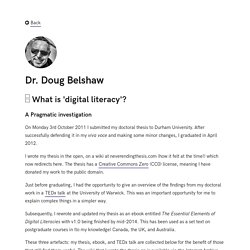
The Zoom Gaze. The Zoom Gaze Video conferencing offers an illusory sense of unilateral control over conversations Autumm Caines December 07, 2020 share.
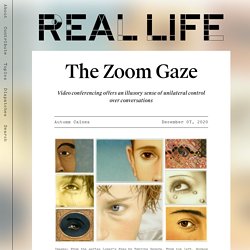
GLAM Collections on Social Media: Navigating Copyright Questions — a conversation with Aleksandra Strzelichowska, Mikka Gee Conway and Anne Young. Aleksandra: For Europeana the situation is special because we give access to content from different institutions across Europe.
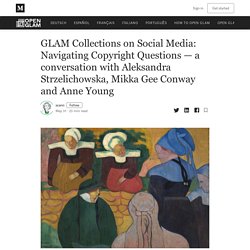
Each country in Europe has different copyright laws and the heritage was digitized in different ways, but luckily the records on our site have licensing information, so we know exactly what can be used and how. For social media platforms, we have a four page document and according to this document, what we share on social media is content that is freely re-usable, which means public domain, CC0, CC BY and CC BY SA. Therefore content which is marked with a non-commercial license cannot be shared on social platforms. For content with a ‘no reuse statement’, we seek individual permission. Sharing Openly Licensed Content on Social Media: A Conversation with GLAM. The following is a summary of “GLAM Collections on Social Media: Navigating Copyright Questions—a conversation with Aleksandra Strzelichowska, Mikka Gee Conway and Anne Young” published on 31 May 2020 by Scann (licensed CC BY).
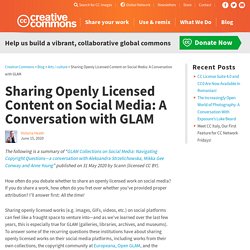
How often do you debate whether to share an openly licensed work on social media? If you do share a work, how often do you fret over whether you’ve provided proper attribution? Of course technology perpetuates racism. It was designed that way. Today the United States crumbles under the weight of two pandemics: coronavirus and police brutality.
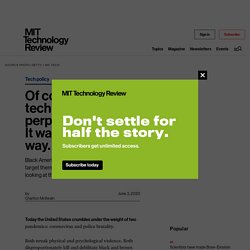
Both wreak physical and psychological violence. Both disproportionately kill and debilitate black and brown people. Copyright, Fair Dealing and Online Teaching at a Time of Crisis. Why the Myers-Briggs test is totally meaningless. Disputing YouTube Content ID Takedowns. As part fo the Digital Millenium Copyright Act of 1998, content service providers (such as YouTube) are given safe harbor from prosecution if they take certain steps to prevent copyright infringement.
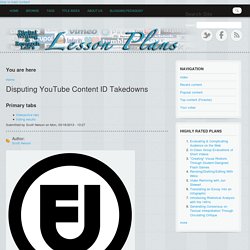
Unfortunately, this has led to a "shoot first and ask questions later" approach on YouTube's part. A Guide for Resisting Edtech: the Case against Turnitin. The 100 Worst Ed-Tech Debacles of the Decade. 85 min read For the past ten years, I have written a lengthy year-end series, documenting some of the dominant narratives and trends in education technology.
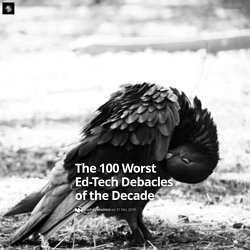
I think it is worthwhile, as the decade draws to a close, to review those stories and to see how much (or how little) things have changed. You can read the series here: 2010, 2011, 2012, 2013, 2014, 2015, 2016, 2017, 2018, 2019. I thought for a good long while about how best to summarize this decade, and inspired by the folks at The Verge, who published a list of “The 84 biggest flops, fails, and dead dreams of the decade in tech,” I decided to do something similar: chronicle for you a decade of ed-tech failures and fuck-ups and flawed ideas. Oh yes, I’m sure you can come up with some rousing successes and some triumphant moments that made you thrilled about the 2010s and that give you hope for “the future of education.” 100. 99. Certainly “free” works well for cash-strapped schools.
The Data Ethics Canvas. Ed-Tech Agitprop. 11 min read.
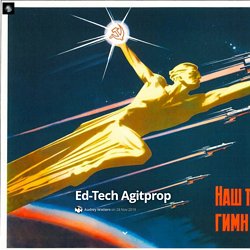
Audrey Watters — Education Technology and The Age of Surveillance Capitalism (A Review of Shoshana Zuboff, The Age of Surveillance Capitalism) A review of Shoshana Zuboff, The Age of Surveillance Capitalism: The Fight for a Human Future at the New Frontier of Power (PublicAffairs, 2019) by Audrey Watters The future of education is technological.
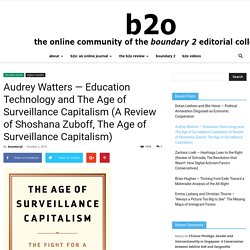
Our digital futures 9: Omni-choice learning. There's plenty of hype about artificial intelligence (AI) and its potential, future impact on society.
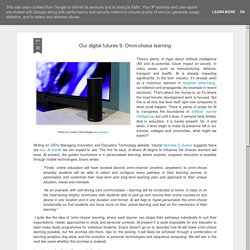
In many areas, such as manufacturing, defence, transport and health, AI is already impacting significantly. In the tech industry, it's already seen as a notorious element in targeted advertising, surveillance and propaganda (for example in recent elections). That's where the money is, so it's where the most frenetic development work is focused. But this is all very low level stuff right now compared to what could happen.
There is plenty of scope for AI to transgress the boundaries of artificial narrow intelligence, but until it does, it remains fairly limited. Raising the bar for internet access: Introducing “Meaningful Connectivity” - Alliance for Affordable Internet. This post was written by Sonia Jorge, Executive Director of the Alliance for Affordable Internet (A4AI), Head of Digital Inclusion at the Web Foundation, and Dhanaraj Thakur, Research Director at the Web Foundation. At the end of 2018, as half the world’s population was online for the first time, it was clear to us that our efforts to secure basic affordable access were not enough. Far too many people remain offline, mostly in low and middle income countries, and among those who are connected, there is a wide disparity in the quality of internet they access.
We must do more to ensure that everyone can access an internet that is transformational and life-changing. To raise the bar for internet access, the Alliance for Affordable Internet (A4AI) has developed “Meaningful Connectivity” — a new standard that measures not only if someone has access to the internet, but the quality of connection they have. Equal internet access is a must for development What makes a connection meaningful? Do Europeans have a right to be globally delisted? The Court of Justice of the European Union says no. Today, the Court of Justice of the European Union (CJEU) has issued a landmark privacy ruling regarding Europeans’ right to request search engines delist search results about themselves. We are excited that the court has considered the effect of such delistings on other fundamental rights like freedom of expression in its decision, but concerned about the increasing reliance of both companies and now courts on geographical barriers to limit access to information on the internet.
Obtaining Copyright Permission to Use Digital and Online Content - Copyrightlaws.com: Copyright courses and education in plain English. Obtaining copyright permission to use digital and online content can be both straightforward and complex. Developing best practices for legally using third-party content helps you stay copyright compliant and lowers your risk of copyright infringement. (Also see our Copyright Leadership Certificate program for these same purposes.)
Below, we set out our copyright tips and strategies to help you create your own best practices. Obtaining Copyright Permission to Use Digital and Online Content Obtaining permission to use digital content, whether online or in a physical container such as a DVD, should generally be approached in the same manner as analog or traditional content. Permission-wise, you need to consider the questions below in any digital project, whether: Simply including a photograph or article on a websiteDeveloping an entire blog or multimedia electronic magazineCreating a digital archives or virtual library Questions to Guide You in Obtaining Copyright Permission. AI bot poses as essay writer for hire to catch contract cheaters. A university has developed a bot that poses as an essay mill to catch students in the act, raising new ethical questions about how to tackle contract cheating. The artificial intelligence tool – named Jack Watson – monitors the internet, identifies students from a particular university looking to contract cheat and provides them with a “watermarked” assignment that will reveal itself on submission.
The development of the tool at Georgia Institute of Technology reflects growing concern among academics about the influence of contract cheating in higher education. One study published last year suggested that as many as one in seven recent graduates may have recruited someone else to undertake an assignment for them. But one expert questioned whether the new approach went too far, likening it to entrapment. Help! My child wants a YouTube channel. The Indispensable Digital Research Tool I can Say, Without Lying, Saves Time – CogDogBlog.
Toby Walsh, A.I. Expert, Is Racing to Stop the Killer Robots. Toby Walsh, a professor at the University of New South Wales in Sydney, is one of Australia’s leading experts on artificial intelligence. 3 Commonly Misunderstood U.S. Copyright Concepts - Copyrightlaws.com: Copyright courses and education in plain English. Web Literacy - Mozilla Learning. Adfeed - Futurebook. Copyright the Card Game – UK Copyright Literacy. As part of our work we have developed a new engaging approach to copyright education sessions. Teaching and Learning Innovation Park. What Is Critical Digital Pedagogy, and Why Does Higher Ed Need It? A growing movement in higher education seeks to bring “critical digital pedagogy” to college classrooms. The Business of Fettering OER - billymeinke.com. The Digital Competence Framework 2.0.
Index. A guide to anti-misinformation actions around the world. Australia Action: Government task force Focus: Foreign disinformation campaigns* In June 2018, four units of the government set up a task force to identify potential cyberattacks and foreign influence campaigns targeting upcoming Australian elections. - A Brief History of Ed-Tech 1989 - 2049. Millions of people uploaded photos to the Ever app. Then the company used them to develop facial recognition tools. The Ever AI website makes no mention of “best moments” snapshots. Instead, in news releases, it describes how the company possesses an “ever-expanding private global dataset of 13 billion photos and videos” from what the company said are tens of millions of users in 95 countries.
Facebook told advertisers it can identify teens feeling 'insecure' and 'worthless' Facebook showed advertisers how it has the capacity to identify when teenagers feel “insecure”, “worthless” and “need a confidence boost”, according to a leaked documents based on research quietly conducted by the social network. The internal report produced by Facebook executives, and obtained by the Australian, states that the company can monitor posts and photos in real time to determine when young people feel “stressed”, “defeated”, “overwhelmed”, “anxious”, “nervous”, “stupid”, “silly”, “useless” and a “failure”.
The horizon of self – Digital – Learning – Culture. Inclusive learning and teaching - Anglia Ruskin University. 'The goal is to automate us': welcome to the age of surveillance capitalism. How to keep AI from turning into the Terminator (opinion) 2018 Report. Algorithms and Media Literacy - The Association For Media Literacy. Film featuring Cleveland digital redlining now on line. - The Washington Post.